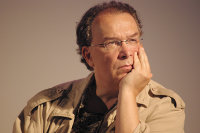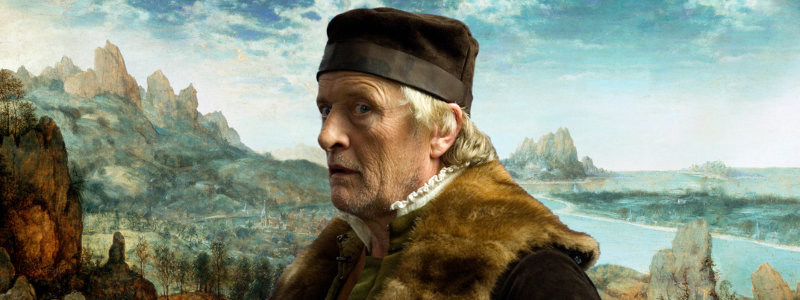Director - Lech Majewski

In 2006, the Museum of Modern Art in New York honored Lech Majewski with a major retrospective of his works, entitled "Lech Majewski: Conjuring the Moving Image." Curated by Laurence Kardish, the retrospective presented Majewski's films and video features. The world premiere of a unique sequel of thirty-three videoart pieces was the highlight of the opening night at MoMA. Exhibited later by many galleries and museums, Blood of a Poet was installed at the Berlinale in February, 2007, and in June became a part of the 52nd Venice Biennale, where it was shown in two locations: as the non-stop projection on Campo San Pantalon, and on multiple screens inside the Giudecca's Teatro Junghans. New York Times critic Jeannette Catsoulis wrote: "Lech Majewski creates an aesthetic of dysfunction that's as beautiful as it is disturbing. After a while the film's expressiveness becomes so hypnotic that it's difficult not to make your own connections."
In 2007, the Lech Majewski Retrospective that originated at MoMA, traveled to the Art Institute of Chicago, Portland Art Museum, Cleveland's Wexner Arts Center, SIFF Seattle, UCLA Film Archive, Berkeley Art Museum; and the National Gallery in Washington DC. The Washington Post's Philip Kennicott wrote: "Majewski is a brilliant filmmaker whose haunting aesthetic is processed through a lively mind and idiosyncratic imagination, chastened and tempered by history, and captured on screen with the rigor and perfectionism of an artist who might also carve castles out of toothpicks. Throughout his films, the great categories of our existence - the public and private, the personal and political, the natural world and the man-made one - constantly dissolve into one another."
In 2005, two major retrospectives of Mr. Majewski's works were organized in Buenos Aires/Mar del Plata and in London, where the British Film Academy, Riverside Studios and Curzon Cinemas showed his films, while the Whitechapel Art Gallery showed his video art pieces. A year earlier he assembled a collection of visual poems entitled Divinities and published his fifth novel.
2002 saw a number of Mr. Majewski's works appear. The Lithuanian National Opera staged his new version of Carmen, while theatergoers in Germany could see his production of The Three Penny Opera as well as Tramway performed in Düsseldorf. He also published his fourth novel, on which he based his film The Garden of Earthly Delights, an Anglo-Italian production shot in Venice and London. Completed in 2004, it won the Grand Prix at the Rome International Film Festival. "There is magic in The Garden of Earthly Delights' intimate passion plays," wrote R. Emmet Sweeney in The Village Voice. "Each moment becomes achingly gorgeous." "This film puts to shame most other love stories in its honesty," wrote The Washington Post; "within a very philosophical framework, Majewski manages to tell an astonishingly human story: the staggering weirdness of being human - frail, material, dependent, and filled with ideas and aspirations that transcend everything. The Garden of Earthly Delights is among the most powerful films made in years."
In 2000, Majewski began filming Angelus, an epic about Silesian coalminers living in an occult commune. "There's a purified aura of beauty in Angelus that creates a sometimes stunning sense of the imagination overcoming all obstacles," wrote Robert Koehler in Variety; "the film's mode of setting up fantastically designed and lensed tableaux shots, has a nearly hallucinating impact on the eye." Angelus won a number of prizes, including a Fellini Award and Grand Prix at Cameraimage. In the same year it was presented at Venice's Palagraziussi (in collaboration with the Venice Biennale), and in 2002 at the Museum of Modern Art in New York, and Galerie Nationale du Jeu de Paume in Paris.
In 1999, Majewski directed the feature film Wojaczek, which was shown at a number of festivals, including Rotterdam, Berlin, Jerusalem, Rio de Janeiro, London, Mexico City, New York, Montreal and Los Angeles. The film received over twenty prizes, among them the European Award at the Festival of European Cinema in Corato, Italy; a V Forum of European Cinema Award in Strasbourg; and in Barcelona where the International Federation of Film Societies chose it as the Best Independent Film of the Year 2000, giving it a prestigious Don Quixote Award. The amateur Krzysztof Siwczyk, who played the lead, was nominated by the European Film Academy as the Best European Actor. "Superb and surprisingly witty," Michael Phillips wrote in Chicago Tribune: "Wojaczek operates on a deadpan comic tone established by its achingly beautiful sense of visual composure. Excellent!"
In 1997, Mr. Majewski staged and filmed in Germany his own version of Shakespeare's A Midsummer's Night Dream. A year later, he produced a series of CD's featuring Polish modern music masters, notably Henryk Mikołaj Górecki. In the same year he staged the experimental TRAMWAY a 90 kilometer performance, and built an installation in the Modern Art Gallery of his native town of Katowice. A video based on this exhibition won a Silver Award at the 32nd Houston International Film Festival.
In 1996, he debuted as a composer (together with Józef Skrzek) and a librettist, writing his autobiographical opera The Roe’s Room. It premiered at the Silesian Opera and was awarded a Golden Mask. Polygram Records also brought it out as a double CD. Subsequently, the International Theater Institute (ITI) selected this production from over five hundred entries as one of the dozen best new operas in the world, and in 1998 presented it in Düsseldorf. In the same year, based on his opera, Mr. Majewski made a videoart feature The Roe’s Room, described as "absolutely singular 'autobiographical film opera'... Limpidly beautiful 'cycle of life' parable... One of a kind !" (Time Out London); "Ravaging intensity!" (The Washington Post); and "a strange, entrancing beauty that possess a memorable, haunting quality" (Variety).
In 1995 Lech Majewski co-produced Basquiat, a film based on the story he wrote, starring Jeffrey Wright, Benicio del Toro, Willem Dafoe, Gary Oldman, Courtney Love, Dennis Hopper, and David Bowie as Andy Warhol. In the same year he directed in Heilbronn, Germany The Black Rider. His version of this postmodernist opera by Bob Wilson, Tom Waits and William Burroughs won him the "Killianpreis" for best direction and was praised by German critics as "true mastery" (Stuttgarter Zeitung), "a magnificent, hypnotic spectacle" (Stimme), "a breathtaking journey into the unknown" (Rundblick).
In September of 1995, the Polish National Opera opened the new season with his production of Bizet's Carmen, transmitted live by Canal+. The prestigious magazine Opera International cited this staging among the best of 1995 opera productions in the world. His staging of Penderecki's Ubu Rex in 1993 first brought Mr. Majewski to the opera world and earned him several awards including a Golden Mask for the best production and Golden Orpheus at the 1994 Warsaw Autumn Festival. In 1992, together with David Lynch's Propaganda Films, he produced and directed Gospel According To Harry, which Piers Handling of the Toronto Film Festival called "a visionary film poem." Viggo Mortensen debuted in the lead role.
In 1986, Mr. Majewski went to Rio de Janeiro to develop a screenplay with the "world's most wanted man," Ronald Biggs, one of the perpetrators of England's Great Train Robbery. Prisoner of Rio (1989) was completed at Pinewood Studios and released worldwide by Columbia Pictures-TriStar. Mr. Majewski acted both as the Director and Executive Producer of the film, raising all of the financing.
In 1982, on the River Thames, he staged Homer's Odyssey, receiving much attention and acclaim. The London Times hailed it as "potent theatre." He has published several books of poetry, essays and fiction. Based on his first novel, he wrote a screenplay for his US debut Flight of the Spruce Goose (1985). It was produced by Michael Hausman, who was also behind such films as Milos Forman's Amadeus and David Mamet's House of Games.
While still in Poland, Mr. Majewski wrote and directed two feature films: Annunciation (1978) and The Knight (1980), which Janet Maslin described in the New York Times as "a haunting, austere parable directed with assurance... His film retains its spare, arresting visual style throughout," and by Kevin Thomas in the Los Angeles Times as "beautiful and mystical."
Filmography
THE MILL & THE CROSS (Angelus Silesius, 2010)
writer/director/producer/cinematographer/editor/composer
GLASS LIPS (Angelus Silesius, 2007) writer/director/producer/cinematographer/editor/composer
THE GARDEN OF EARTHLY DELIGHTS (Mestiere Cinema - Metaphysics Ltd, 2004)
writer/director/producer/cinematographer/editor/composer
ANGELUS (Filmcontract, 2000) writer/director/set designer/composer/editor
WOJACZEK (Filmcontract, 1999) writer/director/editor
BASQUIAT (Miramax, 1996) writer/producer
GOSPEL ACCORDING TO HARRY (Propaganda Films, 1992)
writer/director/producer
PRISONER OF RIO (Columbia TriStar, 1988) writer/director/producer
FLIGHT OF THE SPRUCE GOOSE (SGF - USA, 1986) writer/director/producer


